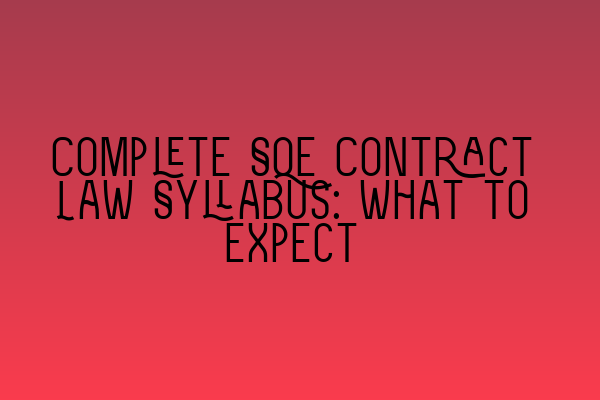Complete SQE Contract Law Syllabus: What to Expect
Are you considering a career in contract law? If so, you may already be familiar with the Solicitors Qualifying Examination (SQE) and its contract law syllabus. Understanding what to expect from this syllabus can help you prepare effectively for the exam and set yourself up for success in the field of contract law.
In this blog post, we will take a closer look at the complete SQE contract law syllabus and provide insights into each topic you can expect to encounter during your studies. We will cover everything from the basics of contract law to more complex concepts, ensuring you have a comprehensive understanding of the subject matter.
1. Introduction to Contract Law
The SQE contract law syllabus begins with an introduction to the fundamental principles and concepts of contract law. You will explore the key elements of a contract, including offer, acceptance, consideration, intention to create legal relations, and certainty. Understanding these foundational concepts is crucial, as they form the basis for the rest of your contract law knowledge.
To delve further into the realm of contract law, it is important to understand the impact of frustration on contractual obligations. This Legal Insights article provides valuable information on how frustration can affect contract performance and the parties involved.
2. Formation and Content of Contracts
Once you have a strong grasp of the basics, the syllabus moves on to cover the formation and content of contracts. This involves understanding the rules relating to offer and acceptance, as well as the rules surrounding the communication of acceptance. You will also delve into the different types of contractual terms, including express terms, implied terms, and exclusion clauses. Interpreting contractual clauses can be challenging at times, but this article on unlocking the hidden meanings of contractual clauses can help shed some light on the subject.
3. Vitiating Factors
Vitiating factors have the power to invalidate a contract, making this topic another important aspect of the SQE contract law syllabus. Topics covered include misrepresentation, mistake, duress, undue influence, and illegality. It is crucial to understand how these factors can impact the validity and enforceability of a contract, as they frequently arise in real-life contract disputes.
4. Discharge of Contracts
The syllabus then explores the various ways in which a contract can be discharged. From performance and agreement to frustration, breach, and impossibility, you will examine the different circumstances that bring a contract to an end. Understanding the impact of frustration on contractual obligations is valuable in this context, as it can render a contract unenforceable. This Legal Insights article can help expand your knowledge on the topic.
5. Remedies for Breach of Contract
When a breach of contract occurs, parties have certain remedies available to them. This part of the syllabus covers the different types of remedies, including damages, specific performance, injunctions, and restitution. It is essential to understand the circumstances under which each remedy can be sought and the factors that the court will consider when deciding on an appropriate remedy.
6. Agency
The SQE contract law syllabus also covers the principles of agency, exploring the relationship between principal and agent and the rights and obligations that come with it. Agency relationships often arise in the business context, making it an important topic for aspiring commercial lawyers.
7. Consumer Contracts
Consumer contracts are another key area covered in the syllabus. Understanding the legal aspects of business contracts is crucial for entrepreneurs and business professionals alike. This article provides key considerations for those entering into business contracts or dealing with consumer contracts.
8. Assignment and Third-Party Rights
The syllabus then moves on to cover the rules regarding assignment and third-party rights. You will explore the circumstances under which contract rights can be assigned to a third party and the impact of such assignments. It is important to understand when third parties may be able to enforce contract rights and the limitations that may apply.
9. Dispute Resolution
The final topic covered in the SQE contract law syllabus is dispute resolution. You will examine the various methods of resolving contract disputes, including negotiation, mediation, arbitration, litigation, and alternative dispute resolution (ADR). Having a strong understanding of these methods and their advantages and disadvantages is crucial when working in contract law.
By mastering the content of the complete SQE contract law syllabus, you will be well-prepared to tackle the exam with confidence. The SQE exam will test your knowledge and understanding of various topics in contract law, so it is important to approach your studies with a comprehensive and organized approach.
Remember, exploring related articles on specific topics can provide you with additional insights and help reinforce your understanding of the subject matter. Be sure to check out these related articles for further information:
– Exploring the Impact of Frustration on Contractual Obligations: Legal Insights
– Interpreting Contractual Clauses: Unlocking the Hidden Meanings
– Legal Aspects of Business Contracts: Key Considerations for Entrepreneurs
– Agreements in Contract Law: Understanding Its Various Types
– Essentials of Consideration: Understanding the Basis of Contractual Exchange
We hope this guide has helped shed light on what to expect from the complete SQE contract law syllabus. Remember to approach your studies diligently, seek additional resources when needed, and seek guidance from experienced professionals to enhance your understanding. Good luck in your journey to becoming a contract law expert!
